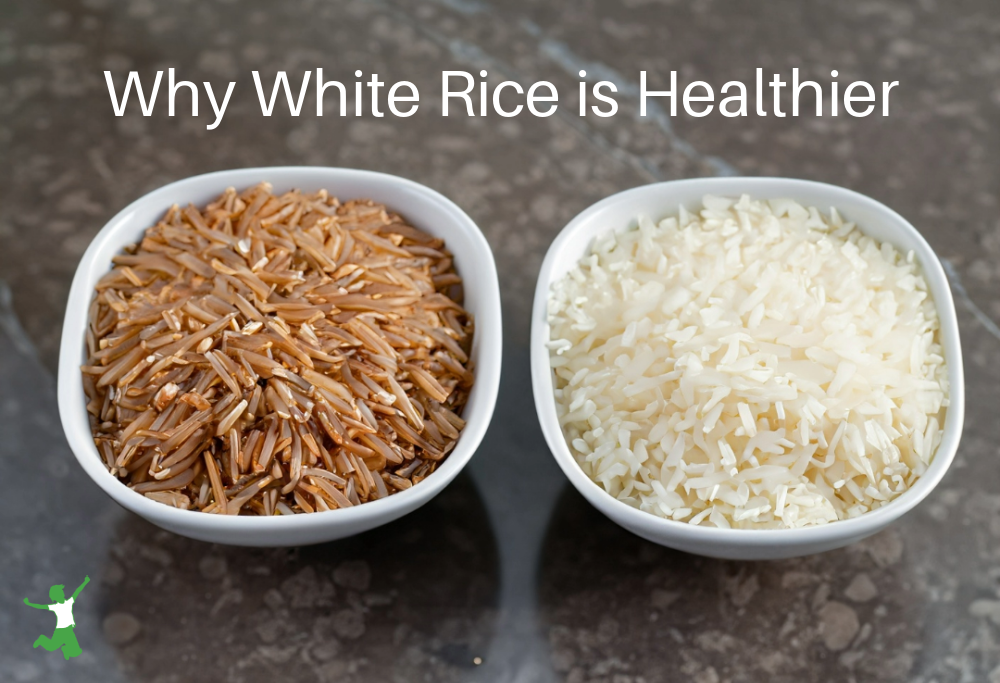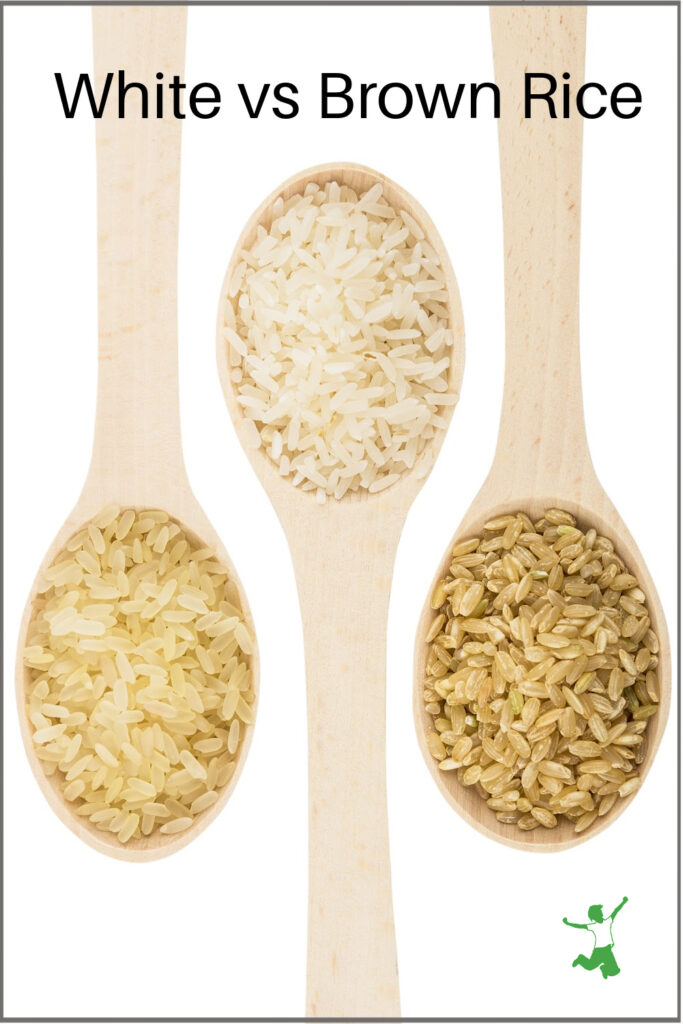The reasons white rice is healthier than brown rice as determined by research as well as which type traditional societies preferred consuming.

My article and video on healthy Chinese food drew some comments from readers who questioned my choice of rice.
Why was I using white rice vs brown? Isn’t brown rice the healthier choice, after all?
Ok, I’ll spill the beans, rice. Here are my reasons …
The truth is, neither my husband nor myself have ever enjoyed brown rice (although we love the nutty flavor and digestibility of wild rice).
Every time we eat brown, it just seems to not sit very well in our stomachs.
Even when it is sprouted or soaked before cooking, it, well, uh, sits like a brick for lack of a better word.
Why Some People Should Eat White Rice
White rice just seems to digest a whole lot better for us. That to me was reason enough to choose it over the brown rice.
We were also advised by an Ayurvedic MD back in the 1990s to stick with white basmati rice. This recommendation clinched the decision.
You are what you digest, after all – not necessarily what you eat!
End of story? Well, not quite.
Rice Fiber in Brown Harms a Compromised Gut
A few years back at the annual Wise Traditions Conference, I became familiar with a compelling book called Fiber Menace.
The author writes extensively about the dangers of a high-fiber diet as it pertains to a menu loaded with whole grains as pushed by the misguided Food Pyramid.
In other words, folks who eat a bowl of All Bran every morning to keep the bathroom visits regular are unknowingly ripping their insides to shreds.
The basic premise of Fiber Menace is that grain fiber plays a leading role in many gut-related ailments including colon cancer.
When I first learned of this information, my preference for white rice over brown rice started to make more sense.
Perhaps the brown rice didn’t digest that well because of all that fiber?
Chalk one up for the white rice.
White Rice Far Lower in Phytic Acid
A second piece of information came from author Ramiel Nagel.
In his book, Cure Tooth Decay, he writes about the devastating effects of phytic acid in the diet. Phytic acid is a very powerful antinutrient and blocker of mineral absorption in the gut.
Mr. Nagel identifies brown rice as very high in phytic acid.
What’s more, soaking brown rice does not reduce phytic acid by much at all!
Polished Rice is the Ancestral Form
Ramiel also maintains that the traditional method for preparing brown rice is never to eat it whole (with only the husk removed).
Rather, ancestral societies pounded brown rice in a mortar and pestle to polish it by removing the outer bran layer. This is the primary source of the phytic acid.
Nagel goes on to point out that experiments have shown that the milled and polished rice that results from this pounding process, has the highest mineral absorption.
In short, mineral absorption from whole brown rice is much less than white polished rice. This is because the phytic acid in the bran which is not reduced much by soaking, greatly interferes with the absorption process.
What About Arsenic?
A big issue with arsenic contamination in rice has emerged in recent years. Some folks have responded by no longer eating rice at all.
This is an overreaction, in my view.
Clean rice is definitely available if you know what to look for.
This article on how to avoid arsenic in rice details what to do. While soaking brown rice barely moves the needle on phytic acid, soaking white rice before cooking removes nearly all the arsenic!
Another option is to parboil white rice before using fresh water for a full cook if you don’t have time to soak.
Is White Rice Better Than Brown?
So it seems that brown rice is not necessarily a healthier choice than milled white rice.
Black or red rice would fall into the same category.
Obviously, whether you choose one or the other is a personal preference, but I hope this information helps you sort through the decision with a bit more clarity.
As for me and my family, we will be sticking with white basmati and jasmine rice (white basmati rice is more nutritious than plain white rice).
I currently buy this brand of rice in 25-pound bags as the most economical and high-quality choice.
Observation clued me in many years ago that brown rice was not something that was sitting well in my stomach or my husband’s.
As the years go by, more research is coming forth to indicate that this decision was the right way to go after all.
Do you eat white rice or brown rice in your home? Why or why not?

References
(1) Fiber Menace
(2) Living with Phytic Acid
More Information
Macrobiotic Diet and Extreme Vitamin D Deficiency
Tiny Teff Grains Deliver Big on Nutrition
How to Make Perfect Yellow Rice (Arroz Amarillo)
Millet: Healthy or Not?
Do Whole Grains Cause Cavities?








I found this interesting article (see link below) today and wanted to add it to the discussion.
Health researchers said this month they had found a troubling link between higher consumption of white rice and type 2 diabetes. “What we’ve found is white rice is likely to increase the risk of type 2 diabetes,” said Dr. Qi Sun of the Harvard School of Public Health.
drsircus.com/diabetes/white-rice-diabetes/
What kind of white rice did they use in the “study”? If these people ate a lot of white rice from restaurants, they cook this white rice in SUGAR WATER. That’s why it sticks together so nicely on the plate or bowl when they serve it.
If the white rice is properly soaked and cooked at home in filtered water only, what would those results be?
My guess is that the researchers didn’t distinguish at all and simply asked the participants how often they ate white rice (most people would have gotten it from takeout and restaurants)
Loved this article. Makes all kinds of sense to me — I regret raising my kids on brown rice now.
@Sarah. Re soaking rice and keeping the soaking water in the refrig. No, I don’t know where I read that, so I can’t prove anything. I suspect that the claims are correct, because the cooked rice is really quite a bit different from brown rice cooked in the usual way. More delicate somehow, a bit more like white rice, perhaps. Taste is not as strong.
Also, I forgot to mention that after you drain off the soaking water, you rinse your rice before you cook it in fresh water. As to the soaking water, it should be diluted from time to time is what I remember. I am sorry I cannot be more helpful in providing proof. IMO white rice of today (not the partially refined, traditional white rice of ages past) is pure refined carb with little to no nutrients. However, like anything else, eating it from time to time in the context of a good diet is certainly enjoyable. My family enjoys this so I cook it up for them sometimes. For me, I may as well be eating a dish of ice cream – there is no sense of nutrition in white rice for me. Thank you for your article.
Thank you for this article. I’ve been intuitionally choosing white over brown rice for awhile now. And now I know why thanks to your article. I’ve also noticed that brown rice doesn’t “sit well” as you said, in my stomach. I am a very healthy eater – using only organic ingredients, soaking beans and grains, and preparing home cooked meals as much as possible. I don’t eat processed foods. Lately I’ve been having indigestion (lots of gas) and wondering what it could be from. I’m thinking too much fiber? Can eating too much salad give me too much fiber, and is this a possible cause of stomach issues? What foods have too much fiber and which foods do not? How to create a good balance?
Thank you for an informative research backed article. Unfortunately, your brand of basmati rice is not showing in Amazon. Perhaps you could test that link again?
I just tested the link and it is working. Are you in Canada or another country outside the US? If so that is probably why. The brand is Lundberg and I buy the 25 pound bags of organic basmatic rice. Very budget friendly compared with smaller 1 or 2 pound bags and rice is shelf stable for years in the pantry.
I’ve had increasingly worsening GI issues for many years now, and I’ve also been a big brown rice eater. Could that be the cause? I’m going to eliminate rice altogether for a while to see what happens. If I get better, I’ll start eating white rice. Thanks for the information, Sarah!
Brown rice is very hard to digest even if soaked. I think it’s a good idea to eliminate it for a time and see if things improve!
I learned to undo the phytic acid in brown rice as follows: First time you decide to cook & eat brown rice, soak it for many hours. Save that soaking water in the refrigerator.
Second and subsequent times you want to consume brown rice, use that soaking water. At some point, the amount of phytase gradually increases. Each time you soak with the refrigerated soaking water, add a bit more water to compensate for the liquid absorbed by the rice. Hope you can follow this.
When the phytase (enzyme which undoes the phytic acid) is fully developed, you will know, because the cooked rice tastes rather different from brown rice which has not been treated in this manner. This specially treated brown rice is just as healthy as white rice.
Also, I would opine that people who eat a lot of red meat and other animal products could, over time, become overmineralized, for example in iron and zinc. Too much of these is associated with cancer. Therefore, plain brown rice which hasn’t received the above phytase treatment would keep them in balance.
I have not made any of this up. This procedure was tested years ago, but I don’t remember by whom.
Interesting! Do you have a reference for this method that demonstrates a reduction in phytic acid in the brown rice?
I’ve studied Ayurveda for some years and only eat white basmati because it is said to be more digestible. I have found that all rice tends to spike my blood sugar though. I still eat it now and then but it is not a regular food in my diet. I wonder sometimes if my Irish / Scottish heritage does not recognize rice and potatoes are not as much of an issue for me.
Yup! Genes matter. Can’t undo heredity.
Potatoes are not native to Ireland and Scotland, so they can’t be part of your physical heritage, though they’re undoubtedly part of your cultural heritage. Potatoes are native to the Americas and were introduced to Europe in the second half of the 16th century.
My family is crazy for jasmine rice! Glad to know it’s not a bad option. As we just went grain free it doesn’t effect our family so much but I will definitely mention it to my Mom!
Thanks for posting!